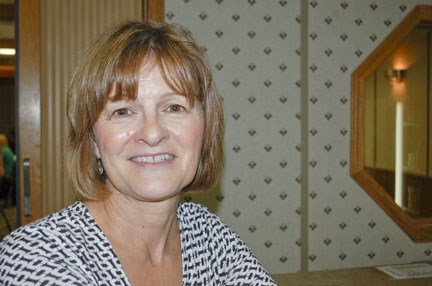People who are battling cancer and who live outside Saskatchewan's two major cities, have gained the respect and attention of Debra Polischuk, director of support for the Canadian Cancer Society.
Polischuk, who works from a Regina-based office, said that is one good reason why they had organized six cancer-related retreats throughout the province outside of Regina and Saskatoon.
Polischuk helped to lead a one-day Living Well with Cancer retreat in Estevan on Sept. 14, an event that attracted 30 registered participants in the Taylorton Room at the Days Inn.
Presenters included Dr. Marika Geis, a primary care practitioner, who focuses on naturopathic medicine and cancer intervention techniques; Stacey Drebnicki of Estevan a personal trainer and paramedic and Joanne Frederick, a psychologist.
Polischuk said the impetus for the Estevan workshop was provided by local cancer survivor and society advocate Mary Antonenko and others who have been at the forefront of cancer awareness and survival events.
"The retreats are there to offer tools for cancer survivors because too many people who are fighting cancer feel they are going through it alone. It's an opportunity to meet someone else who is also fighting it or has fought it," Polischuk said.
"They go through the normal course of treatment, but are then asking 'what else can I do?' and if they're not in Regina or Saskatoon and the core treatment centres, they're interested in options but don't know what to turn to or where to turn."
Polischuk said the retreats bring ideas to the participants such as quality exercise habits they can get into. They learn what they can do from the diagnosis stage to the next stage. That's where the Cancer Society's initiatives can really kick in, she said.
"This retreat idea is a new initiative this year and we're getting a lot of positive feedback. It's a big thing and we're finding out that the people like to spend the day with others in the community who are going through their own adventures and none of them have to travel a long distance to do it," Polischuk said.
The original $20,000 to $30,000 budget to conduct these admission-free retreats will be tweaked as the society moves forward.
Polischuk said she is surprised with the level of frustration cancer victims experience as they attempt to work with health regions where they live and work.
"Just getting to a treatment centre and trying to stick to treatment schedules that keep changing on them, leaves them with a lot of frustrations. There are fine lines drawn here and when a person is first diagnosed with cancer they are inundated with information that many can't absorb all at once. While they're still processing the first round of information, they're getting more and more thrown at them. So I can sympathize with the people who have been diagnosed and then live outside of the major centres," Polischuk said.
Rebecca Hauge, peer support group director for the Canadian Cancer Society, led the participants in an ice-breaking exercise to begin the day, and Dr. Geis followed with an introduction to naturopathic medicines and procedures that can augment traditional cancer treatments.
With a primary care practice, Geis said supplemental treatments may include Chinese traditional interventions, lifestyle counselling, botanical medicines and nutritional advice along with exercise.
"Naturopathic doctors, and there are 30 of us in the province, are not to be confused with others who claim to provide the services and hang out their shingles after completing a weekend course," said Geis. "We are medically trained, but we take different approaches and we have to take the time to learn health histories and discover how that impacts the lives and body through a non-invasive means. We can help the body heal itself. It's not always broken, sometimes it just needs a push in the right direction, and we try to find a way to allow the body to do what it wants to do, which is heal."
Geis said a variety of assessment methods can be used during diagnosis using conventional science and natural therapies.
"The body wants to do well and we want to do no harm," she added.
"It's the old adage, prevention is the best medicine, so we work with the healing power of nature yet won't ignore the persistent signals. Just make sure you check the credentials of your naturopathic doctor if you're choosing this route. You'll want one who is registered and certified," she said, suggesting patients chose one who has spent seven years or more in training, not seven days.
She went on to explain, "no doctor wants to set you up for failure, so there are several determinants of health such as nutrition, elimination, structure, heredity, mental and emotional status those are all discussed with first visits. Keep in mind that cancer is in everyone. Normally, the healthy immune systems seek out and destroy aberrant cells. When immunity is weakened, the cancerous process begins and has to be fought," she said. "So all other syndromes factor into the equation such as weight, diabetes, cardiovascular afflictions and so on."
In total, Geis said the modalities we use can augment conventional cancer treatments, something the patient can do after diagnosis and outside of the two major cities.
Drebnicki discussed the benefits of exercise during cancer treatments and beyond.
Frederick, a cancer survivor herself, discussed the practice of mindfulness and how it empowers people in their day-to-day lives.
The retreat that began at 10 a.m. included a noon luncheon and continuous programming until the wrap-up at 4 p.m.




